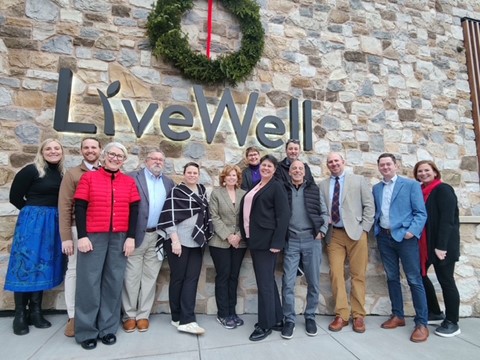
Author:
Kim Warchol, President and Founder of DCS at CPI
Holidays are a time for fun, food, music, decorations, and gatherings of family and friends. Even though someone may be living with dementia, they will still want to participate in lifelong traditions and celebrations. However, due to cognitive changes, holidays for people with dementia won’t be the same as they were in the past.
Let's discuss some changes people with dementia may experience and then ways we can adapt the celebration so the person can still participate and enjoy it.
Changes in Cognition Throughout the Journey of Dementia
In the early stages of dementia, people depend on structure and familiar routines for security and more autonomy; they help the person know what to expect and how to act. Incorporating their favorite traditions, songs, and foods into celebrations will allow them to participate fully. People at this stage of the disease may need set-up support or a reminder of a celebration time but will be able to participate in a familiar holiday activity.
As the disease progresses to the middle stage, people with dementia can still perform familiar actions with familiar objects. However, they will need the support of one person for initiation and cues to participate in an activity. Attention is becoming significantly impaired, so shorter activities (30-45 minutes) are preferable. The person's verbal abilities are beginning to decline so they may communicate more with behaviors than words. Incorporating their favorite traditions, songs, and foods into celebrations may trigger long-term memory and will allow them to participate to their best ability. People at this stage of the disease need more time to process what is happening, and for us to slow down in our communication and give one-step-at-a-time cues so they can participate in parts of a familiar holiday activity.
In the late stage of the disease, the person's best ability is making gross motor movements. The person's ability to process information and cues in the environment is much slower. Because of this, these individuals need more time in a quiet setting before they participate in holiday activity. People at this stage of the disease can become easily overwhelmed in noisy, busy spaces. Therefore, smaller group gatherings in a quiet area with simple, familiar holiday decorations allow them to enjoy holiday activities to their best ability.
At the end stage of dementia, a person's best ability is responding to stimulation with all five senses; they still feel love, can laugh, and communicate through facial expressions. Creating a sensory experience around each holiday that includes their meaningful sights, sounds, tastes, and touches allows the person to experience familiar holiday activities with their friends and family members. Holidays for people with end-stage dementia are best experienced with one-on-one support from a caregiver or family member in a quiet space. Familiar tastes, sounds, sights, and touches should be presented slowly, one-at-a-time, to allow the person to experience the holiday stimuli being offered.
Strengths for all people with dementia are long-term and procedural memories. Using familiar traditions, routines, and objects allows the person with dementia to participate in activities such as holiday events to the best of their ability.
Memories attached to strong emotions also tend to survive. Music has a strong emotional association and can be used throughout the stages of dementia to bring joy, calm, and meaning to life. Christmas music and decorations from their formative years may have imprinted strongly in their memories. Using those as part of your holiday plans will help people living with dementia feel safe and secure. It can also help reduce negative behavioral expressions since they have those items and sounds in their memories.
Adaptations that Create Happy Holidays for People with Dementia
- Because of decreased attention and slower processing speeds, a flurry of activity may cause the person with dementia to become overstimulated and stressed.
- Limit decorations, especially blinking light displays.
- Limit the size of group activities; smaller gatherings offered multiple times during the holiday or holiday season provide the person the chance to engage in a less hurried way.
- Schedule important activities for their best time of day.
- Ask the family to visit on alternate days instead of in one big group.
- Offer small, quiet spaces where residents and family can gather in twos and threes for visits.
- Challenges in processing stimuli can cause feelings of insecurity for the person with dementia. Discover what familiar traditions, tastes, sights, sounds, and touches give comfort to the person.
Simplify lifelong traditions:
- Instead of a four-course Thanksgiving meal, perhaps each person could share one favorite recipe per day in the days before the holiday.
- Decorate a Christmas tree over several days with special ornaments the person recognizes instead of one big tree-trimming party.
- Use aromatherapy to bring in familiar holiday smells: pine tree scents, peppermint, etc.
- Music can elicit emotions and memories and help provide a link to a person's past and promote interconnection with caregivers and others with dementia. Play holiday music that is familiar to the person with dementia. Have small sing-a-longs with familiar holiday tunes. Let the music set the stage for the person with dementia:
- Jingle Bells for a rousing sing-along with friends to increase energy and alertness.
- Silent Night with a warm beverage before bed to soothe and calm.
- Familiar routines and familiar objects result in feelings of security and autonomy. Allow the person with dementia to participate in holiday preparations to the best of their ability. Examples include:
- Rolling dough
- Decorating cookies
- Making decorations
- Wrapping presents
Have each person share a special tradition with others in the care community. If possible, have family bring photos of past holidays for reminiscing groups.
End-Stage Dementia and Celebrations
Discover from the family what the person's favorite family holidays and traditions were. Consider creating a holiday sensory stimulation kit that will bring that holiday back for the person in a meaningful way. Prepare the family prior to their visit for what types of responses and communication they can expect from their loved one. Share how to use the holiday sensory kit with the family so they are experiencing the holiday with their loved one. Finally, limit use of the sensory kit to 15 minutes at a time so as not to overstimulate the person.
Choosing Gifts for Someone with Dementia
We all love receiving presents, and persons with dementia are no different. The gifts we give still need to be meaningful and enjoyable, but with the added twist of understanding the stage of dementia they are in and what adaptations we need to provide so they can enjoy the gift. Check out this article for ideas on how to choose the right gift.
Holidays are a special time in all our lives. Holidays for people with dementia may need some adaptations to experience the fun, food, music, decorations, and gatherings of family and friends to decrease the risk of fatigue or distress behaviors. The good news is that our understanding of the stage of the disease the person is in, and how to adapt the activity or experience for them at each stage, can create a situation where the person can still thrive and enjoy the holiday.
Happy Holidays to all!
Gain the knowledge and skills to optimize function, safety, and quality of life for those you serve and certifications to distinguish yourself or your organization as a leader
Posted: December, 2023
Share This Post:
Tell Me More!
Learn how our solutions can benefit you or
your organization.
Continue Learning:



